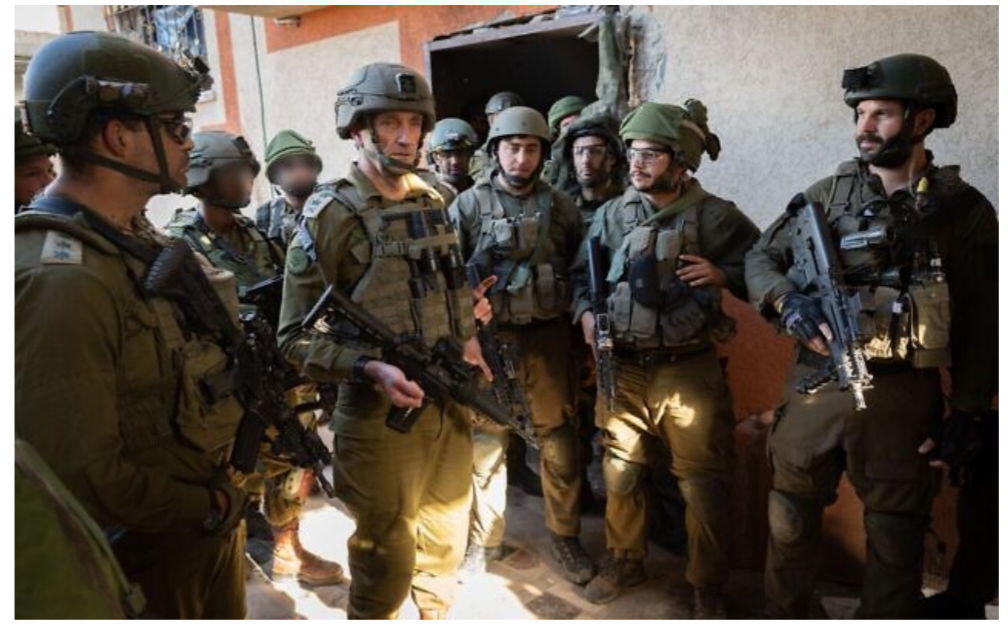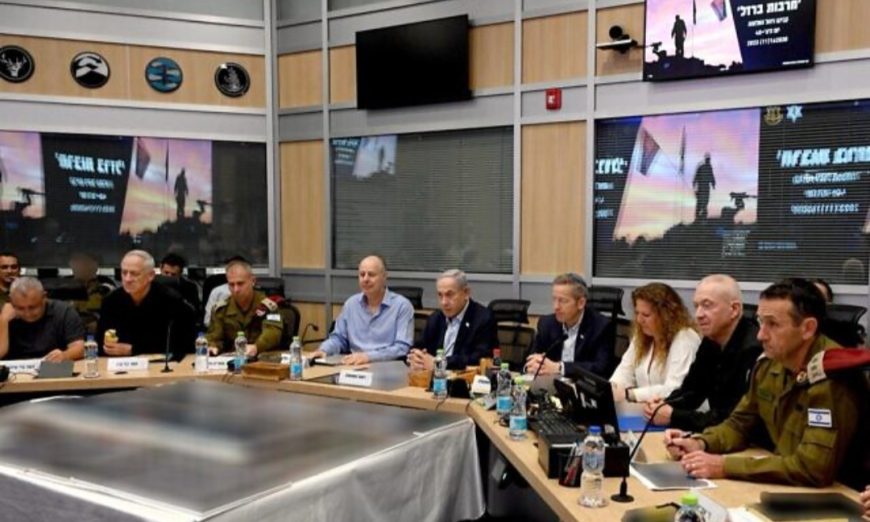Government meets on proposed deal to release some 50 Israeli hostages over 4 days of ceasefire. Deal provides for more releases later. Palestinian prisoners to be freed, but not murderers.
The Prime Minister’s Office announced on Tuesday afternoon that Prime Minister Benjamin Netanyahu would be convening a series of cabinet meetings in the evening, apparently to approve a deal that would see the release of dozens of Israeli hostages held by Hamas.
The announcement from the PMO stated that Netanyahu would be gathering ministers “in light of developments on the issue of the release of our hostages,” without elaborating.
Netanyahu was slated to convene the war cabinet at 6 p.m. local time, the broader security cabinet at 7 p.m. and the full cabinet at 8 p.m. The announcement was the first confirmation from Israel that a serious deal to release some of the approximately 240 hostages held by terror groups in Gaza since October 7 is close.
Two far-right parties were set to vote against the deal, but it was seen likely to be approved by the 38-member full cabinet with a large majority.
Netanyahu told a group of soldiers Tuesday afternoon that “we are making progress. I don’t think I should say too much more, even at this moment, but I hope there will be good news soon.”
Various reports of the deal have indicated that somewhere between 50 and 100 Israeli and foreign hostages would be released, in exchange for a five-day break in fighting and the release of somewhere between 150 and 300 Palestinian prisoners held in Israeli jails. Reports over the past week have said that Israel was demanding the release of all the children held in Gaza and their mothers as a condition.
An Israeli government source told reporters Tuesday evening that the deal is expected to see the release of 50 living Israeli citizens, mostly women and children, in groups of 12-13 people per day. In exchange Israel will release Palestinian women and minors from prison and return them to where they used to live, mostly the West Bank and East Jerusalem, pause fighting for four days and allow the entry of more fuel to the Strip.
The source said that all Israeli security agencies — the IDF, Shin Bet and Mossad — are in favor of the emerging deal. The official said that Netanyahu has insisted on certain elements being part of the deal, including the potential for the ongoing release of hostages even after the 4-5 day pause, a commitment by Hamas to identify and locate hostages being held by other terror groups in the Strip, and the refusal to release Palestinian prisoners who have been convicted of murder.
The source said Israel believes Hamas could potentially locate some 30 more Israeli mothers and children beyond the initial 50, and that the halt in fighting could be extended by an extra day for each group of 10 more Israeli hostages located and freed.
The source made clear that Israel would pause its war against Hamas in Gaza as soon as the first group of hostages were released, and would resume the campaign, aimed at eliminating Hamas’s military and governance capacities in Gaza, as soon as the phased process of hostage releases was completed.
Once the cabinet approves the deal, it is expected to go into effect only 24 hours later, to allow for appeals to the High Court against the release of Palestinian prisoners, with the first wave of hostage releases expected only Thursday at the earliest.
US President Joe Biden said Tuesday “we are now very close” to reaching a deal: “We could bring some of these hostages home very soon,” he told reporters at the White House.
“But I don’t want to get into the details of things because nothing is done until it’s done,” he added. “Things are looking good at the moment.”
Minister Benny Gantz, a member of the war cabinet, said Tuesday afternoon that “the entire Israeli society, all its tribes, right and left, are praying for and want the return of our boys and girls home safely. We are doing everything we can to bring them back as fast as possible.”
Defense Minister Yoav Gallant said that Israel will need to make “difficult decisions” with regard to any such deal: “We are moving step by step toward the total defeat of Hamas and getting closer to bringing the hostages home.”
“We will all have to make difficult, important decisions in the coming days,” he said following an assessment at the IDF Gaza Division base in southern Israel. “There is not a moment throughout this campaign, 45 days, that I don’t think about the hostages.”
IDF chief Herzi Halevi said Tuesday that IDF activity on the ground in Gaza “creates better conditions for the return of the hostages. It deals blows to Hamas, it creates pressure, and we will continue this pressure.”
The comments came after both the leader of Hamas and key mediator Qatar both said a truce agreement with Israel was in sight.
Reports have varied on the exact makeup of the deal.
Sources from Hamas and Islamic Jihad, speaking to AFP on condition of anonymity, said the tentative agreement would include an exchange of hostages for Palestinian prisoners in Israeli jails, along with a five-day pause in fighting in Gaza.
The deal, according to AFP, would see a complete pause of IDF operations on the ground in the Gaza Strip and an end to Israeli air operations over the territory, except in the north, where they would only halt for six hours daily, sources said, including an Israeli official.
While there will be six hours a day when the IDF will not use drones to gather intelligence on activity in the Strip, the IDF and Shin Bet will maintain the ability to continue gathering intelligence even during the pause in fighting, the Israeli source said.
Between 50 and 100 Israeli civilian and foreign hostages would be released, but no military personnel, and in exchange, some 300 Palestinians would be freed from Israeli jails, among them women and minors, according to sources cited by AFP.
But an Israeli government source said that the deal has nothing to do with hostages who are not Israelis, and that other governments may be working on separate deals.
Izzat Rishq, a senior Hamas official, said Tuesday that an agreement could be reached “in the coming hours.” Hamas’s leader in exile, Ismail Haniyeh, also said a deal was close, but similar predictions in recent weeks have proven premature.
Qatar said Tuesday afternoon it was “very optimistic” on finalizing a deal that would see the release of dozens of hostages.
Majed Al Ansari, the spokesperson for the Qatari Ministry of Foreign Affairs, wrote on X: “We are working towards an agreement taking place and we are now at the closest point we ever have been in reaching and an agreement. We are very optimistic, we are very hopeful, but we are also very keen for this mediation to succeed in reaching a humanitarian truce.”
Support from Israel’s full cabinet is required to approve any hostage release deal that includes freeing Palestinian prisoners, according to the Israel Democracy Institute’s Moran Kandelshtein-Haina.
In line with a 2014 amendment to the Government Law, the cabinet is required to approve the early release of prisoners. Early release is possible only under tight national security or foreign relations conditions, including the release of Israeli citizen or residents held hostage, or as part of a foreign policy agreement.
Earlier Tuesday, National Security Minister Itamar Ben Gvir said that any deal that included the release of Palestinian prisoners from Israeli jails would be “a very, very big mistake.”
Ben Gvir, chair of the Otzma Yehudit party, told Channel 14 that any such swap “will bring us to disaster,” pointing to the 2011 deal to release more than 1,000 Palestinian prisoners — including Hamas leader Yahya Sinwar, thought to be the mastermind of the October 7 massacre — in exchange for captive IDF soldier Gilad Shalit.
Both the Otzma Yehudit and Religious Zionism parties issued statements Tuesday evening that they opposed the deal and intended to vote against it. Ben Gvir’s party said in a statement that it believes the deal “would endanger the ground forces fighting in Gaza and undermine the war effort,” as well as “significantly reduce the chances of returning the remaining abductees held by Hamas, including our soldiers.”
The Religious Zionism party said it believes the burgeoning deal is “bad for Israel’s security, bad for the hostages, and bad for the soldiers of the IDF,” adding that it views the only viable option to be “continuing the unceasing military pressure on Hamas until total victory.”
Opposition Leader Yair Lapid said that he was receiving a security briefing from the prime minister’s military secretary ahead of the succession of cabinet meetings Tuesday evening.
Family members of many of the hostages met Monday evening with Netanyahu and members of the war cabinet. Many of them have been harshly critical of the government’s failure to bring their loved ones home more than six weeks after their capture.
Several family members left in the middle of the meeting, fuming over what they said were mixed messages the government has given them regarding the goals of the war.
The families have been organizing protests, rallies, and marches to press the government on securing their loved ones’ release. On Saturday, families of hostages and thousands of their supporters demonstrated in Tel Aviv’s Hostages Square in a rally focused in particular on the some 40 children believed held in Gaza.
Since October 7, four hostages have been released from Gaza, one was rescued in an IDF operation and the bodies of two hostages were recovered by the military and brought back to Israel.

IDF Chief of Staff Lt. Gen. Herzi Halevi speaks with troops in the Gaza Strip, November 21, 2023. (Israel Defense Forces.)

